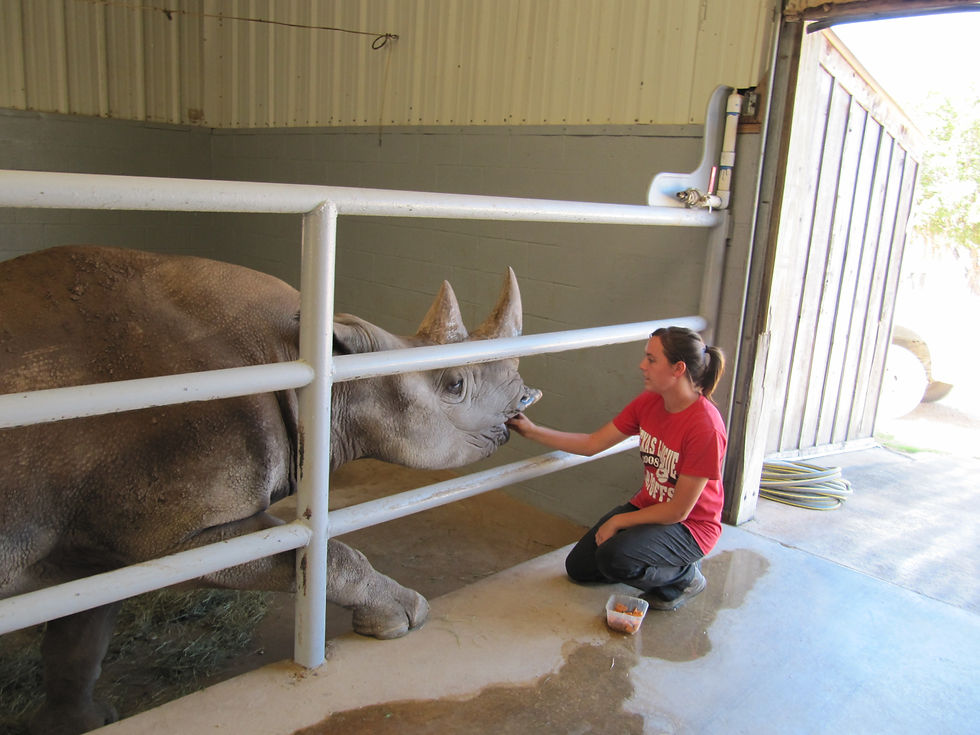
PROFESSIONAL DEVELOPMENT
Providing diverse opportunities to rhino professionals.
The International Rhino Keeper Association (IRKA) has developed a program that will provide rhino keepers the opportunity to expand their knowledge and husbandry experience. This program has been designed to enable rhino keepers to work at other institutions to familiarize themselves with different management styles.
KEEP (Keeper Educational Exchange Programme) collaboration
IRKA is excited to partner with KEEP, a small not-for-profit organization, run by 4 UK Zookeepers, aimed at connecting keepers and collections. They provide a platform for zoos to advertise practical placements that will help keepers from other collections develop their knowledge and understanding of animal husbandry. Since launching in January 2023, KEEP has overseen over 50 placements in the UK and welcomed over 250 keepers and 30 collections. They are partnered with Hose2Habitat and BIAZA and are proud to be collaborating with both AAZK and IRKA.
To find out more about the program, follow them on Facebook at: www.facebook.com/ZooKEEPX, or have a look at their available placements on their website at www.keeperexchange.org.
IRKA is happy to announce this collaboration and provide applications for scholarships to all professional members.
Approval process:
The keeper participating in this program must not only have their institution’s authorization, but agreement to pay their wages. The institution’s approval requires that employee is covered by their institution’s workmen’s compensation and will provide documentation of personal health insurance. This will provide assurance that the hosting institution will not be liable to cover medical costs. When application has been approved, there will be a fee of $10 to be contributed to the IRKA scholarship fund.



Keeper Development Program
The International Rhino Keeper Association (IRKA) has developed a program that will provide rhino keepers the opportunity to expand their knowledge and husbandry experience. This program has been designed to enable rhino keepers to work at other institutions to familiarize themselves with different management styles. Due to the professional nature of this program, it is only available to Professional Rhino Keeper Association members.
The IRKA has selected facilities with different management styles to maximize the keepers’ potential for enhancing their expertise. It is the hope of the IRKA that the institutions participating in this program will take this opportunity to share their trials, tribulations, triumphs and successes with their professional colleagues. At this time, the hosting institutions are: Busch Gardens Tampa, The Wilds, San Diego Zoo Safari Park, African Rhino Protection Initiative, White Oak Conservation Center, and Fossil Rim. The concept of the program is quite simple, but we feel it is an invaluable tool for expanding the skills of rhino keepers by providing them the opportunity to work alongside their colleagues and learn the nuances of that institution’s husbandry practices.
Approval process:
The keeper participating in this program must not only have their institution’s authorization, but agreement to pay their wages. The institution’s approval requires that employee is covered by their institution’s workmen’s compensation and will provide documentation of personal health insurance. This will provide assurance that the hosting institution will not be liable to cover medical costs. When application has been approved, there will be a fee of $10 to be contributed to the IRKA scholarship fund.
FIND OUT MORE ABOUT HOSTING INSTITUTIONS
Plan your rhino adventure! Learn more about breeding dynamics, enrichment and training, reproductive strategies, general care and management and neonate care. Contact Joe Hauser with any further questions or to help create your own Professional Development Program.

At the African Rhino Protection Initiative, a private rhino facility located in North Texas, keepers will work alongside staff that manages southern white rhinos in a naturalistic 400-acre pasture mixed with various species of African hoofstock. You may also get to participate in assisted reproduction procedures, ultrasonography, and blood draws with a few of the rhinos in the collection. Learn the different challenges associated with managing and caring for white rhinos with other animals in

At Fossil Rim Wildlife Center keepers will work alongside our staff who manage southern white rhinos and southcentral black rhinos in a variety of styles. We were very involved in the AIRS project so visiting guests will participate in blood draws, assorted training scenarios, management of the individual black rhinos, as well as management of the herd of white rhinos. We have multi-acre areas, which create other challenges that keepers will learn about while visiting.

Come see how White Oak Conservation manages large populations of Southern white rhinos and greater one horned rhinos, as well as Southern black rhinos. Learn about daily care, habitat management, blood draws, and veterinary procedures required to house rhinos in large acreage habitats. Keepers may have the opportunity to tour or shadow other areas depending on schedule. Visit www.whiteoakwildlife.org to see all the species housed at White Oak.

At the African Rhino Protection Initiative, a private rhino facility located in North Texas, keepers will work alongside staff that manages southern white rhinos in a naturalistic 400-acre pasture mixed with various species of African hoofstock. You may also get to participate in assisted reproduction procedures, ultrasonography, and blood draws with a few of the rhinos in the collection. Learn the different challenges associated with managing and caring for white rhinos with other animals in


